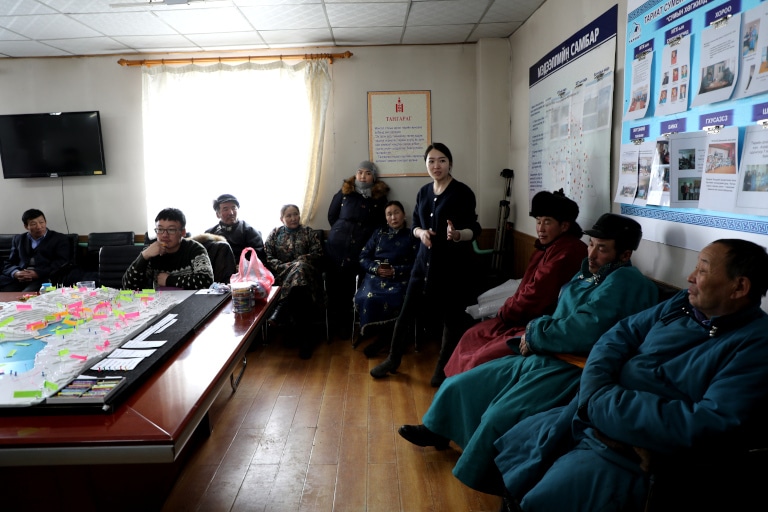CLIMATE-ENERGY
POLICIES
Informing and guiding climate and energy policies so that they facilitate the transition to a low-carbon society and boost people’s resilience and well-being.
MISSIONS AND CHALLENGES
While a growing number of civil society actors are mobilizing to contribute to the energy and ecological transition towards a low-carbon, more resilient society, it is essential for these efforts to be facilitated by the introduction of coherent, ambitious, fair public policies, thought out at territorial level and within an appropriate legislative and regulatory framework.
With this in mind, as its field operations are mainly dedicated to promoting a sustainable energy transition designed to improve people’s well-being, while contributing to climate change mitigation and adaptation, Geres helps governments and local authorities, particularly in the South, to prepare public policies and plans of action in line with their transition objectives and taking into account the reality of the climate changes likely to affect them.

A VARIED FIELD OF EXPERTISE
In the field of climate and energy policy, Geres works primarily on behalf of governments, national public institutions, donors, local authorities or development organizations (international NGOs, development agencies, etc.).
Its expertise focuses mainly on the following topics:
1- Analysing climate/energy issues
- Evaluation of the impacts of climate change and identification of potential levers to reduce greenhouse gas emissions (particularly through implementation of the energy transition)
- Evaluation of a group or territory’s vulnerability to climate issues and visualization of the expected benefits of adaptation and resilience strategies
2. Analysing interactions between projects/programmes and climate/energy issues
- Evaluation of the climate performance of the projects and programmes implemented by Geres or other organizations and measuring of their impacts in terms of emission reduction or carbon capture
- Evaluation of projects’ capacity to cope with the climate changes they are liable to face (climate-proofing)
3- Influencing public energy and climate policies
- Optimization of the convergence between energy policies and climate issues, to ensure that energy policies encourage and speed up the energy transition towards a low-carbon society and greater resilience amongst the population, particularly at local level
4- Supporting Geres institutional partners
- Identification and definition of the most relevant projects and the necessary financing levers, methodological support and plans of action
5- Fundraising for the climate and carbon finance
- Identification of accessible finance dedicated to the climate (mitigation and adaptation) and support for the institutional partners of the projects run by Geres in raising those funds and/or developing the engineering needed to manage them properly
- Identification of the most reliable and relevant carbon finance instruments and matching projects with such finance in order to consolidate their continuity

Some examples of specific initiatives
Analysis of climate/energy issues
- Assisting the government in preparing its intended nationally determined contribution (INDC) for COP21 in Guinea
- Identification of capacity-building needs for implementation of the NDCs and methodological and structural recommendations for such capacity-building (West Africa)
- Facilitation of the Climate and Development Committee of Coordination SUD
Evaluation of vulnerabilities
- Assessment of vulnerability and climate-proofing on water and energy initiatives (Pakistan)
- Establishment of an atlas of vulnerabilities in Ferlo (Senegal)
- Assessments of vulnerability (Niger, Burkina Faso – Boucle du Mouhoun, Afghanistan – Districts of Bamyan province)
- Climate-proofing (Jatropha project in Mali and Burkina Faso).
Planning, boosting resilience and capacities
- Agriculture and Resilience: climate planning in Collines (Benin)
- Planning in areas exposed to deforestation (Cambodia)
- Climate and energy planning in urban and peri-urban areas (Morocco)
- Agricultural planning and activities in Arkhangai (Mongolia)
- Skills strengthening for government actors in Francophone Africa
Direct impacts in relation to the Sustainable Development Goals
All these initiatives make a contribution to the decentralization of climate and energy policies, with direct beneficial effects, not only economic (development of new productive activities and job creation) and social (dynamization of local democracy) but also environmental (they help to reduce forest degradation and deforestation by regulating use of forest products and conversion of forest areas).
Geres work contributes directly to 7 SDGs
- SDG 1: Eradication of poverty
- SDG 7: Affordable and clean energy
- SDG 8: Access to decent work
- SDG 9: Industry, innovation and infrastructure
- SDG 11: Sustainable cities and communities
- SDG 13: Climate action
- SDG 15: Life on land
CROSS-CUTTING APPROACHES GUARANTEEING QUALITY
To ensure the sustainability and scaling up of our activities, Geres expertise is provided according to methodological principles with one major ambition: enabling the most vulnerable to become decision-makers and stakeholders in the energy transition.
In the field of climate and energy policy, we adopt three major approaches:
Territorial approach
To ensure ownership by all stakeholders.
Economic development
To promote rules discouraging investment in fossil fuels and, conversely, encouraging energy management measures and rollout of renewable energy, considered as two levers of prosperity at the service of a low-carbon economy.
Capacity-building
Supporting and advising local stakeholders, including institutional and government actors, to facilitate scaling up and roll out activities relating to climate and energy policies.
